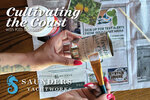
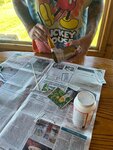
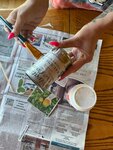
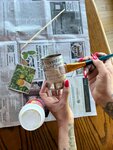
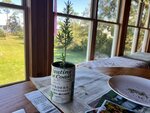
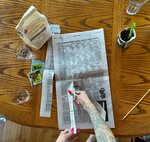
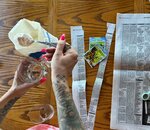
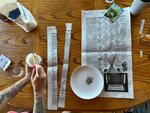
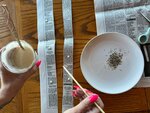
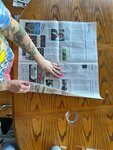
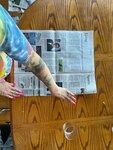

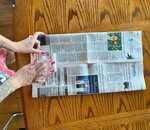
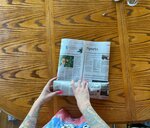

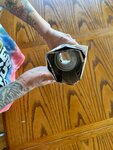
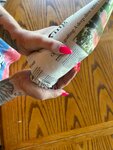
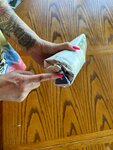
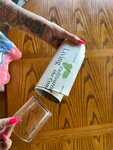
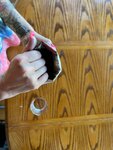
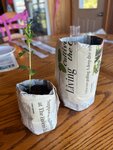
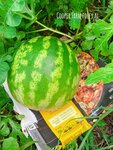
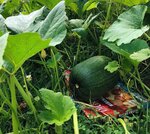
Gardening doesn't just give us fresh veggies, colorful flowers and a peaceful escape — it's also a great way to get creative with the stuff we'd normally toss out.
Before you throw away that empty pizza box or egg carton, think twice. With a bit of imagination, these everyday items can have a second life in your garden. Not only does upcycling help the environment by reducing waste, but it also saves you money on gardening supplies.
Whether you're making seed pots from newspapers or using old clothes to protect your plants, this article will guide you through some fun, easy and eco-friendly ways to give your garden a green makeover. Ready to turn trash into treasure? Let's dig in.
Using old newspaper to make pots is a great option for uppotting seedlings or even seed starting. They're biodegradable, inexpensive and easy to make.
To create newspaper pots:
Step 1: Cut a strip of newspaper and wrap it around a cylindrical object like a glass or rolling pin.
Step 2: Fold the bottom edge inward to form the base.
Step 3: Slip the pot off the mold, fill it with soil, and plant your seeds.
These pots can be placed directly into the ground once seedlings are ready for transplanting. The newspaper will decompose, allowing the plant's roots to expand into the soil.
For smaller seeds such as carrots, radishes or lettuce, spacing them evenly can be challenging. Seed tape makes this easier by creating a controlled planting system. This is especially beneficial when we deal with seeds washing out from a heavy rain or the wind displacing seeds that need to be planted shallow.
Here's how to make seed tape using newspaper:
Step 1: Cut newspaper into strips about an inch wide.
Step 2: Make a paste using a mixture of flour and water until it is a little thicker than glue.
Step 3: Dab small dots of paste along the strip, spaced according to the planting requirements of your seeds.
Step 4: Place a seed on each dab of paste and allow it to dry. When you're ready to plant, simply place the tape in your garden bed and cover it with soil. The newspaper will break down as the seeds germinate, ensuring proper spacing.
Plastic berry containers often end up in the trash, but they can be repurposed into miniature greenhouses. The clear plastic helps trap heat and moisture, creating an ideal environment for germinating seeds or protecting small seedlings. Put old newspaper in the bottom of the container to help keep dirt from washing out but still allows drainage. Fill the containers with soil, plant your seeds, and close the lid. The built-in ventilation holes ensure air circulation, preventing mold from forming. Once your seedlings are established, transplant them into larger pots or directly into your garden.
Tip: Plastic clear egg cartons are great for seed starting this same way.
Egg cartons are a versatile gardening tool. You can use them to start seeds, and their natural divisions make it easy to keep seedlings organized. Choose paper cartons, which can break down in the soil over time. Simply fill with soil, and plant your seeds. You can even plant the entire section into the ground, as the carton will biodegrade. Another use for egg cartons is as a planting guide. By pressing the empty carton into the soil, you can create evenly spaced indentations, ensuring that your seeds are planted at the correct distance apart, making your garden beds more organized and reducing overcrowding.
Tip: Using egg cartons for spacing is perfect for planting carrots or radishes and now is a perfect time to get those in the ground.
Cardboard pizza boxes, instead of ending up in the trash, can play a useful role in the garden. Laid flat on the ground, they act as a natural weed barrier by blocking sunlight and preventing weed growth. This method works especially well in pathways or around large plants, where weeds tend to sprout quickly. Pizza boxes are also helpful for fruit protection. Placing them under heavy fruits like melons or pumpkins can keep the produce off the damp ground, reducing the risk of rot.
Toilet paper rolls are perfect for starting seeds with long roots, such as beans or peas. The cardboard helps encourage deeper root growth, and when the seedlings are ready to be transplanted, the entire roll can be planted in the ground. Like newspaper pots, the cardboard will break down, allowing roots to expand naturally. This is a great option if you have issues with birds/wildlife eating your bean or corn seeds when planting straight into the ground.
Old clothes, such as t-shirts or lightweight fabric, can be transformed into row covers to protect young plants from frost or pests. Simply drape the fabric over your plants and secure the edges with rocks or stakes to the ground. These makeshift covers will help keep your plants warm at night and shield them from pests, allowing them to thrive without the need for chemical sprays.
Have a favorite gardening tip or photo from the newspaper? This can be Mod Podged onto a tin can (don't forget to add a drainage hole to the bottom) and upcycled into a little pot.
Tip: This also makes a creative gift- Just add a plant.
Turns out, you have everything you need to grow your own garden with things just lying around your house that are begging for a second chance to shine as part of your eco-friendly garden. So, the next time you're about to toss something in the trash, take a second look — it might just be the key to growing your next tomato plant or keeping those pesky weeds at bay. Happy gardening, and remember: one person's trash is another gardener's treasure!